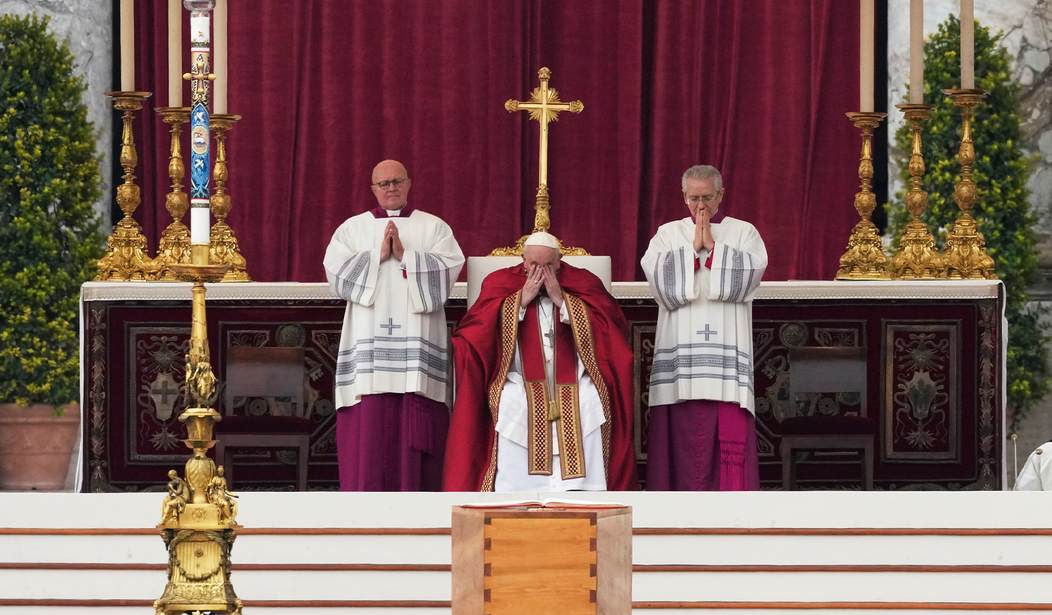Earlier today, Ed Morrissey weighed in on the recent interview granted by Pope Francis to the Associated Press, in which he dropped a comment about homosexuality being a sin, but not a crime. As Ed noted, it was only one very brief comment in a much longer interview, but everyone in the press immediately seized upon it. (Or “pounced” if you happen to be a conservative.) I told him I had some thoughts on the subject as well that I would share with our VIP members this evening, but you should probably go back and read Ed’s article first if you haven’t already.
With that said, I’m not going to take exception (very much, anyway) to Ed’s analysis. He is light years ahead of me on all things related to the Vatican and Catholicism, particularly since I’m a Methodist. But I arrived at my conclusions by taking a considerably more secular route. Before we get started, let’s go back and look once again at what the Pontiff actually said.
Being homosexual is not a crime. It’s not a crime. Yes, it’s a sin. Well, yes, but let’s make the distinction first between sin and crime.
Unfortunately, what the Pope completely failed to do was fully explore that distinction between sin and crime, and it’s an important one, particularly if you’re pondering the more secular aspects of this discussion. And that’s one of the points I wanted to make up front. With all due respect to the Papacy, it’s really not the Pope’s place to be saying what is or isn’t “a crime,” except inside of Vatican City, which functionally operates as a theocracy. Particularly for Americans who respect the Constitution and our democratic system, theocracies tend to leave a bad taste in the mouths of many. Some we may agree with, such as Vatican City. But most tend to be highly autocratic if not downright evil. Iran comes to mind.
Backtracking a bit, the Pope was definitely staying in his lane when he defined homosexuality (or at least homosexual activities, a distinction that Ed made quite correctly) as a “sin.” This is in keeping with the distinction I was trying to draw above. Governments define what a crime is. Religions define sins.
I believe this is an important point. There are still laws against homosexual actions in many places around the world, some of which can still carry the death penalty. (I will again point you to Iran.) But remember that there were sodomy laws in place in the United States right up until the end of the 20th century, not fully evaporating into the pages of history until the case of Lawrence v Texas in 2003. (For clarity, a number of states still have sodomy laws on the books, but they aren’t prosecuted in the post-Lawrence world.)
It is also worth noting that neither the church nor American laws drew much of a distinction in terms of strictly homosexual activity. What they were really cracking down on was sodomy, even if it took place between a man and a woman. That was originally restricted mostly to anal penetration but was later expanded to include oral sex. (Or really any activity that didn’t have a chance of producing children.) Using those definitions and the few available surveys that have been conducted, one heck of a lot of straight people could have been in line for a date with either a judge or the devil.
So at least in the United States, citizens are free from the fear of being prosecuted in a court of law for engaging in homosexual acts. And if your own conscience allows for it, you are not required to worry about engaging in either criminal behavior or sin. Remember… Freedom of Religion, at least in the United States, also means freedom from religion if you wish.
So Americans must be free from unconstitutional dictates from their government. But that doesn’t make you free from the dictates of your church if you choose to practice your religion according to that particular faith. If your church informs you that God (however you define Him) condemns your actions as a sin, the state cannot grant you absolution.
And then there are, of course, many who belong to religions (including the Catholic church) who don’t see eye to eye with some of its mandates and behave accordingly. For example, the Pope will still tell you that contraception is a sin, but only a vanishingly small percentage of Catholics obey that edict.
So where does all of that leave us in terms of the Pope’s declaration? Even though I arrived at my conclusions taking a very different path than Ed, we wound up at essentially the same destination. The Pope said what he’s always said and what modern Catholic doctrine has insisted on for ages to the best of my knowledge. At least in the United States, neither the clergy nor the police will accuse you of breaking the law if you engage in homosexual activity, providing it is consensual and you are an adult. Depending on which religion (if any) you follow, you may be chastised by your spiritual leaders if you confess to doing so. But then you are still obviously left with the decision as to whether or not you would confess such a thing in a church setting. What’s my advice to you on that count? I don’t have anything to offer. You’ll have to wrestle with that one on your own. But I’m not condemning any of my gay friends for what they do in the privacy of their homes.








